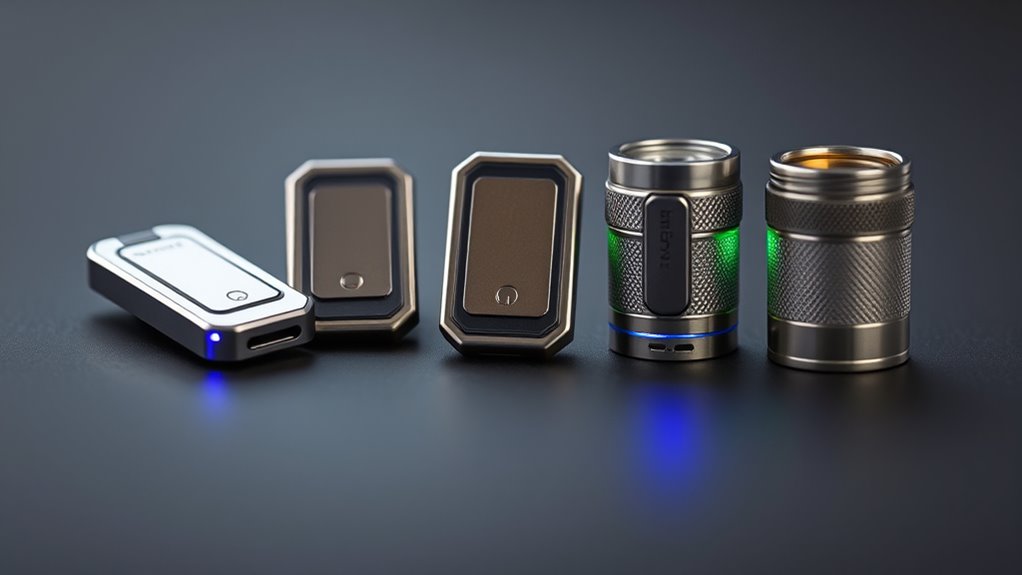If you’re looking to boost your security in 2025, I recommend considering the OnlyKey Security Key and Password Manager, which combines password management with multi-protocol support like FIDO2 and OTP. The Yubico YubiKey 5 NFC offers versatile compatibility and strong phishing resistance. Thales’ SafeNet eToken options excel for organizational use, offering multiple keys and high security standards. The Offline Password Keeper is perfect for offline storage. Keep these points in mind, and you’ll be well on your way to safer accounts.
Key Takeaways
- Compatibility across multiple devices and platforms ensures seamless integration with various operating systems and password managers.
- Support for industry-standard security protocols like FIDO2, U2F, and OTP guarantees robust protection against phishing.
- Ease of use features such as quick setup, one-tap authentication, and minimal button presses simplify user experience.
- Durable, waterproof, and tamper-resistant designs ensure long-term reliability in demanding environments.
- Backup options and cost-effective pricing provide reliable recovery and value for both individual and organizational security needs.
OnlyKey Security Key and Password Manager

If you’re a tech-savvy user looking for a versatile and secure password management solution, the OnlyKey Security Key and Password Manager is an excellent choice. It combines password storage, two-factor authentication, and secure communication in a single device. Supporting multiple methods like FIDO2/U2F, OTP, and Challenge-response, it works seamlessly across major platforms and websites such as Google, GitHub, and Facebook. Its durable, waterproof hardware connects via USB Type A, and PIN protection keeps data safe even if stolen. With encrypted backups and open-source transparency, it offers high security and flexibility, making it ideal for those who want robust protection without sacrificing convenience.
Best For: tech-savvy individuals seeking a versatile, high-security password management and two-factor authentication device compatible across multiple platforms and websites.
Pros:
- Combines password management, 2FA, and secure communication in one device for streamlined security.
- Supports multiple authentication methods including FIDO2/U2F, OTP, and Challenge-response, ensuring broad usability.
- Open-source verified design with encrypted backups and durable, waterproof hardware for high reliability.
Cons:
- Requires technical knowledge for setup and configuration, which may be challenging for less experienced users.
- No secure element in hardware, making private keys potentially vulnerable to advanced hardware attacks.
- Setup complexity and lack of individual slot viewing may be inconvenient for users new to security devices.
Offline Password Keeper with Bluetooth, Secure Storage & Encryption

For users who prioritize offline security and want a reliable way to store their passwords without relying on internet access, the Offline Password Keeper with Bluetooth, Secure Storage & Encryption is an ideal choice. It can securely hold up to 1,000 account credentials offline, using military-grade encryption to protect your data. The device offers convenient autofill with just one click, making login quick and effortless. Its Bluetooth communication means no internet is needed, reducing exposure to online threats. Compatible with both iOS and Android, it provides seamless access across devices while ensuring your sensitive information stays protected in a truly offline environment.
Best For: users who prioritize offline security and need a reliable, encrypted way to store and autofill passwords across multiple devices without internet access.
Pros:
- Stores up to 1,000 credentials securely offline without internet reliance
- Utilizes military-grade encryption for maximum data protection
- Supports quick autofill with one click, streamlining login processes
Cons:
- Limited to offline storage, which may be less convenient for cloud syncing needs
- Bluetooth communication might have pairing or connectivity issues on certain devices
- Not suitable for users seeking cloud-based password management or multi-factor authentication features
Thales SafeNet eToken FIDO Security Key (Pack of 50)
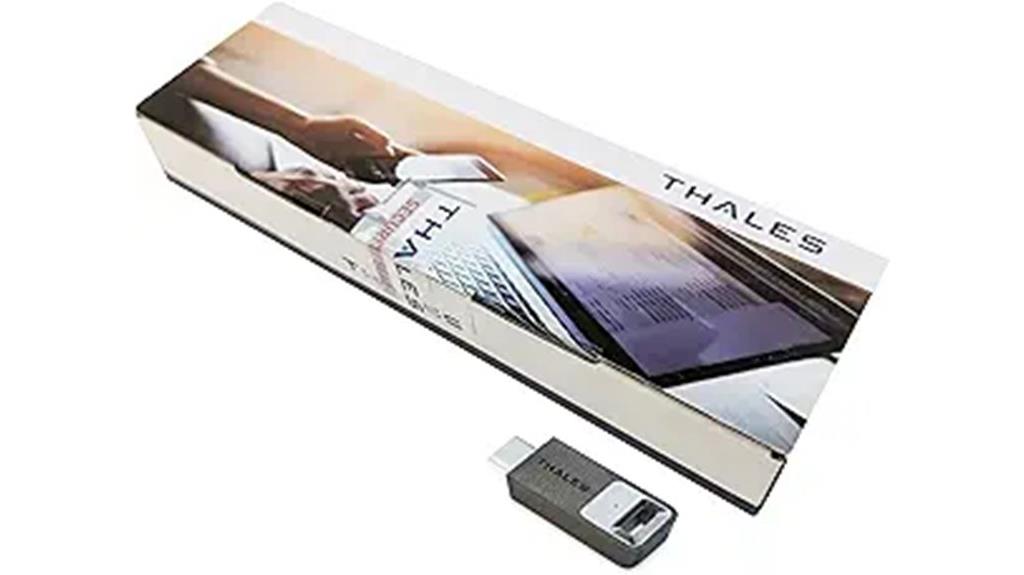
The Thales SafeNet eToken FIDO Security Key (Pack of 50) stands out as an ideal choice for organizations seeking high-volume, secure passwordless authentication solutions. Certified for FIDO2 and U2F standards, it offers phishing-resistant, passwordless login across multiple platforms like Windows, Mac, Linux, iOS, and Android. Its tamper-evident USB-C design, with sensitive presence detection, enhances security and user confidence. Supporting popular services such as Google, Microsoft, and GitHub, it simplifies secure access without passwords. Sold in bulk, this pack of 50 is perfect for organizations aiming to strengthen security while streamlining user authentication processes in 2025.
Best For: organizations seeking bulk, high-security, passwordless authentication solutions for employees and users across multiple platforms in 2025.
Pros:
- Supports FIDO2 and U2F standards for broad compatibility and compliance.
- Tamper-evident USB-C design with sensitive presence detection enhances security.
- Ideal for bulk purchases, making it cost-effective for organizations.
Cons:
- Requires USB-C ports, which may not be available on all devices.
- Bulk packaging may be more than needed for small-scale users.
- Limited to hardware authentication; may need complementary management systems for deployment.
Thales SafeNet eToken FIDO2 Security Key
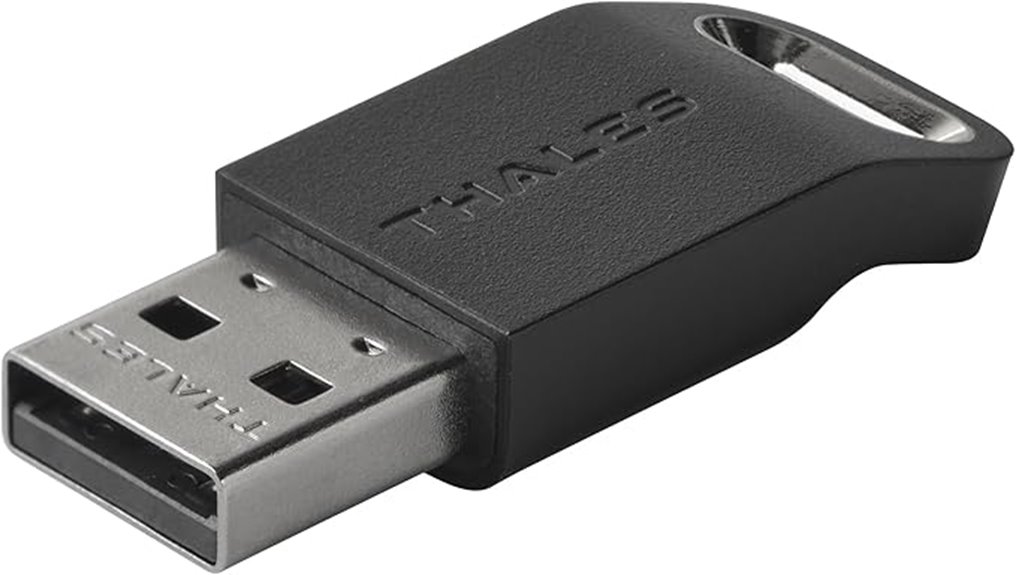
When security and compatibility are top priorities, the Thales SafeNet eToken FIDO2 Security Key stands out as an excellent choice. This tamper-evident USB-A device supports FIDO2 and U2F standards, offering phishing-resistant, passwordless login for web apps, desktops, and devices. It’s compatible with Windows, Linux, and major identity providers like Microsoft, AWS, and Google. With a simple 4-digit PIN and sensitive presence detection, it balances security and convenience. Users praise its durability and seamless integration, making it ideal for personal and corporate use. If you want strong MFA, this device is a reliable, certified solution to elevate your security in 2025.
Best For: individuals and organizations seeking a reliable, certification-approved hardware security key for phishing-resistant, passwordless MFA across various platforms and devices.
Pros:
- Certified by FIDO 2.0 and U2F for strong security standards
- Compatible with Windows, Linux, and major identity providers like Microsoft, AWS, and Google
- Durable, tamper-evident design with sensitive presence detection for added security
Cons:
- Limited documentation may pose setup challenges for some users
- Only supports USB-A, requiring adapters for USB-C devices
- Customer reviews indicate some compatibility issues with certain code signing providers
Yubico YubiKey 5 NFC Two-Factor Authentication Security Key
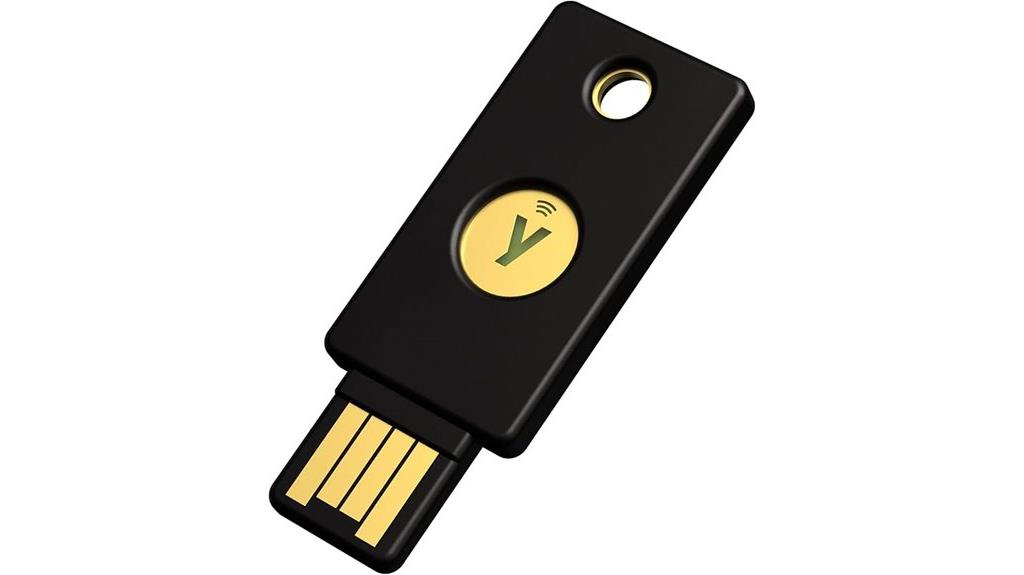
If you’re looking for a versatile and highly secure hardware token, the Yubico YubiKey 5 NFC stands out as an excellent choice. It supports USB-A and NFC, making it compatible with a wide range of devices and platforms like Google, Microsoft, and Facebook. Certified by FIDO, it offers top-tier protection against phishing and credential theft. The device is durable, water-resistant, and tamper-proof, ensuring long-term reliability. Setup is quick and simple—just plug in or tap to authenticate. With no batteries needed, it’s a hassle-free, cost-effective way to strengthen your online security and safeguard your accounts.
Best For: individuals and organizations seeking a highly secure, versatile hardware authentication solution compatible with various devices and platforms.
Pros:
- Supports multiple authentication protocols including FIDO2, U2F, OTP, OpenPGP, and PIV for broad security coverage.
- Durable, water-resistant, tamper-proof design ensures long-term reliability and rugged use.
- Easy to set up with quick tap-to-authenticate functionality, compatible with USB-A and NFC-enabled devices.
Cons:
- Uses USB-A connectivity, which may require adapters for newer USB-C devices.
- Requires physical possession of the device; if lost, access can be temporarily compromised without a backup key.
- No built-in biometric capabilities, relying solely on hardware security protocols for protection.
Factors to Consider When Choosing a Password Manager Hardware Token
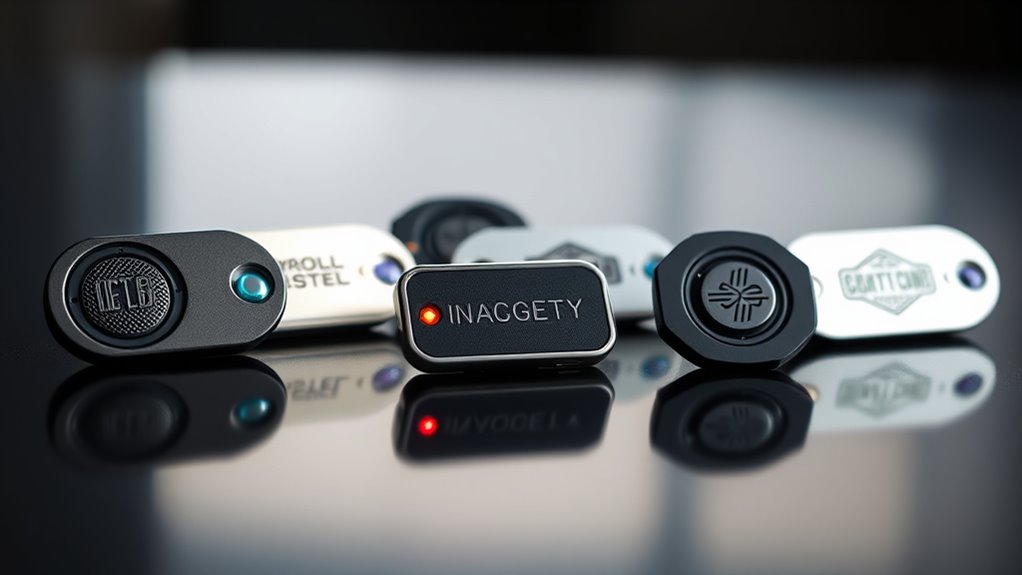
When choosing a password manager hardware token, I consider factors like device compatibility and security features to guarantee it fits my setup. Ease of use and physical durability are also key, so I won’t struggle or worry about damage over time. Plus, I look for reliable backup options in case I lose my token, giving me peace of mind.
Compatibility With Devices
Choosing a hardware token that’s compatible with your devices is vital for smooth and secure authentication. First, I check that it supports my operating systems—whether Windows, Mac, Linux, Android, or iOS—to guarantee it works seamlessly across all platforms I use daily. I also verify the connection type—USB-A, USB-C, NFC, or Bluetooth—to match my device’s ports and capabilities, avoiding any compatibility issues. Multi-platform support is essential, so I look for a token that works across desktops, laptops, smartphones, and tablets without needing extra adapters. Additionally, I confirm it supports the authentication protocols I rely on, like FIDO2, U2F, or OTP. Finally, I consider whether it can pair with my existing password manager or authentication apps for a streamlined experience.
Security Protocol Support
Supporting multiple security protocols is essential because different services often require distinct methods of authentication. When choosing a hardware token, I look for devices that support widely adopted protocols like FIDO2, U2F, OTP, and Challenge-Response to guarantee broad compatibility. It’s important that the token adheres to industry standards, such as FIDO Alliance certification, guaranteeing both security and interoperability. I also check if the device can handle multiple protocols simultaneously, offering flexible options across various platforms. Security features like hardware-based encryption and secure elements are critical for protecting cryptographic keys during storage and operation. Additionally, I verify that firmware updates are available, so the token can stay resilient against emerging vulnerabilities and expand protocol support over time.
Ease of Use
A hardware token’s ease of use can make a big difference in daily security routines. I look for devices with an intuitive setup process that’s quick and straightforward, reducing technical hurdles. Simple authentication methods, like one-tap or quick PIN entry, help streamline login times and minimize frustration. Clear, accessible interfaces with minimal button presses make the device user-friendly, especially for those less tech-savvy. Compatibility with common platforms and applications ensures I don’t need extra software or complicated configurations. Additionally, a reliable physical design—durable buttons and easy connection options—keeps everyday use smooth and frustration-free. Overall, a user-friendly hardware token encourages consistent use, reinforcing security habits without complicating the process.
Physical Durability
Since hardware tokens are often used daily and in various environments, their physical durability is essential for long-term reliability. I look for devices made from rugged materials like tamper-evident metals or waterproof plastics, which can withstand wear and environmental exposure. Shock-resistant casings and reinforced connectors are indispensable to prevent damage from drops or impacts. Tamper-evident and tamper-resistant features add an extra layer of security, making any physical tampering obvious. Water resistance and sealed enclosures protect internal components from moisture, dust, and other elements that could impair function. Choosing a durable token reduces the risk of failure in demanding conditions, ensuring consistent performance and long-lasting security. Physical robustness is a key factor in selecting a reliable hardware token for everyday use.
Backup Options Available
When choosing a hardware token, considering backup options is vital for maintaining access if your primary device is lost, damaged, or otherwise unavailable. Many tokens support encrypted backups or cloning features, making recovery straightforward without compromising security. Some devices require manual configuration of backup keys or recovery codes, which should be stored securely offline to prevent unauthorized access. Relying solely on cloud-based backups can pose security risks, so offline and encrypted backups are generally safer. It’s also wise to have multiple hardware tokens configured as backups, ensuring uninterrupted access even if one device fails or gets lost. Taking these steps helps safeguard your accounts while minimizing the risk of being locked out due to unforeseen device issues.
Cost and Value
Choosing a hardware token involves balancing cost with the value it provides. Prices range from about $20 for basic models to over $50 for premium options, affecting your overall security budget. When evaluating value, consider durability, security features, and compatibility, not just the purchase price. Buying in bulk can lower per-unit costs, making high-quality tokens more accessible for organizations or multiple users. Investing in reputable, certified devices often ensures better long-term value, with consistent security performance and fewer replacements. Comparing features like multi-protocol support and backup options against the price helps identify the best cost-to-benefit ratio for your specific needs. Ultimately, selecting a token that offers reliable security features at a reasonable price maximizes your investment and peace of mind.
Brand Reputation
A strong brand reputation is essential when selecting a hardware token because it reflects the company’s commitment to security, quality, and customer support. Reputable brands usually have a proven track record, giving me confidence that their products are reliable and safe. They often undergo rigorous industry certifications and independent security audits, which ensure their devices meet high standards. I also look for brands with positive user reviews and an active community, indicating satisfaction and trust. Established manufacturers tend to provide regular firmware updates, fixing vulnerabilities and enhancing functionality over time. Choosing a well-known brand greatly reduces the risk of buying counterfeit or compromised hardware tokens, which could jeopardize my security. Overall, a respected brand is key to ensuring my authentication method remains trustworthy.
Frequently Asked Questions
How Do Hardware Tokens Integrate With Existing Password Managers?
Hardware tokens typically integrate with password managers through compatibility with authentication standards like FIDO2 or U2F. I connect my token to my device, and the password manager recognizes it as a secure login method. This setup allows me to enable two-factor authentication seamlessly, enhancing my security. I just need to confirm my password manager supports hardware tokens, and then I can enjoy a more protected, streamlined login experience.
Are Hardware Tokens Compatible With All Operating Systems and Devices?
Think of hardware tokens like keys crafted for specific locks. They aren’t universal, so compatibility varies. Most tokens work seamlessly with Windows, macOS, Android, and iOS, but some may need specific software or drivers. I always check the device’s specifications before buying. This way, you verify your digital fortress remains accessible and secure across all your devices, no matter the platform.
What Is the Typical Lifespan of a Hardware Security Token?
Typically, a hardware security token lasts between 3 to 5 years, depending on usage and environmental factors. I’ve found that regular use can slightly wear down the device, but many manufacturers offer replacements or upgrades. To maximize lifespan, I recommend keeping the token in a cool, dry place and avoiding physical shocks. When it starts showing signs of malfunction, it’s best to replace it promptly to maintain your security.
Can Hardware Tokens Be Reset or Reprogrammed After Purchase?
Yes, hardware tokens can sometimes be reset or reprogrammed, but it depends on the device. Most high-security tokens are designed to be tamper-proof and resettable only by the manufacturer or authorized service providers. I recommend checking the specific model’s documentation before attempting any reprogramming, as unauthorized changes can disable the device or compromise security. Always follow manufacturer guidelines to guarantee your token remains secure and functional.
How Do Hardware Tokens Handle Biometric Authentication Methods?
Hardware tokens handle biometric authentication by integrating fingerprint or facial recognition sensors directly into the device. When I use one, it prompts me to scan my fingerprint or face, confirming my identity securely. This method adds an extra layer of protection, as even if someone steals my token, they can’t access it without my biometric data. I find biometric features make authentication both quick and highly secure.
Conclusion
Did you know that over 80% of data breaches are caused by weak or stolen passwords? Using a hardware token can drastically reduce that risk. After exploring these top options, I’m convinced that investing in a quality password manager hardware token is a smart move for your security. Don’t wait until it’s too late—protect your digital life today and stay one step ahead of cyber threats.
